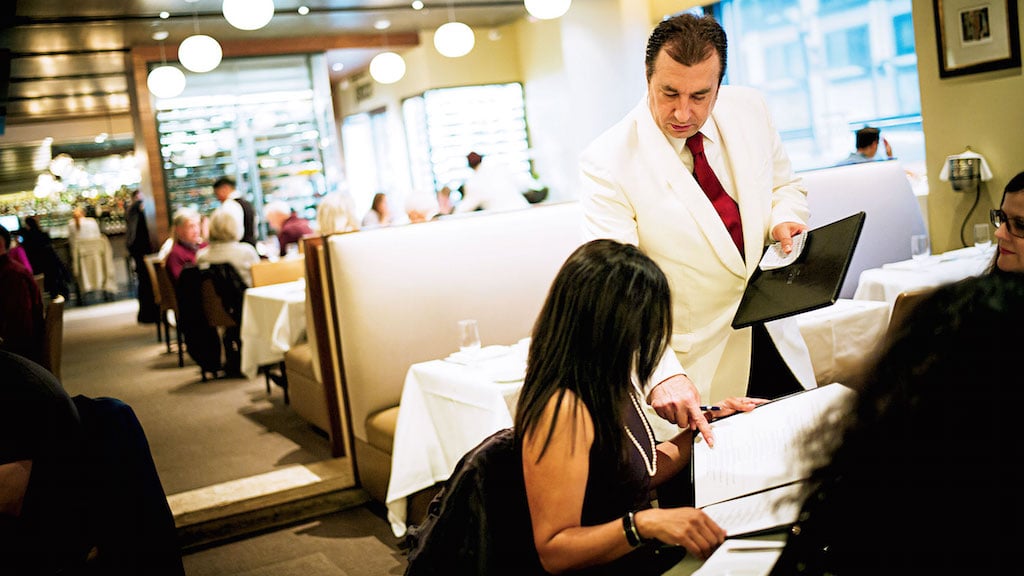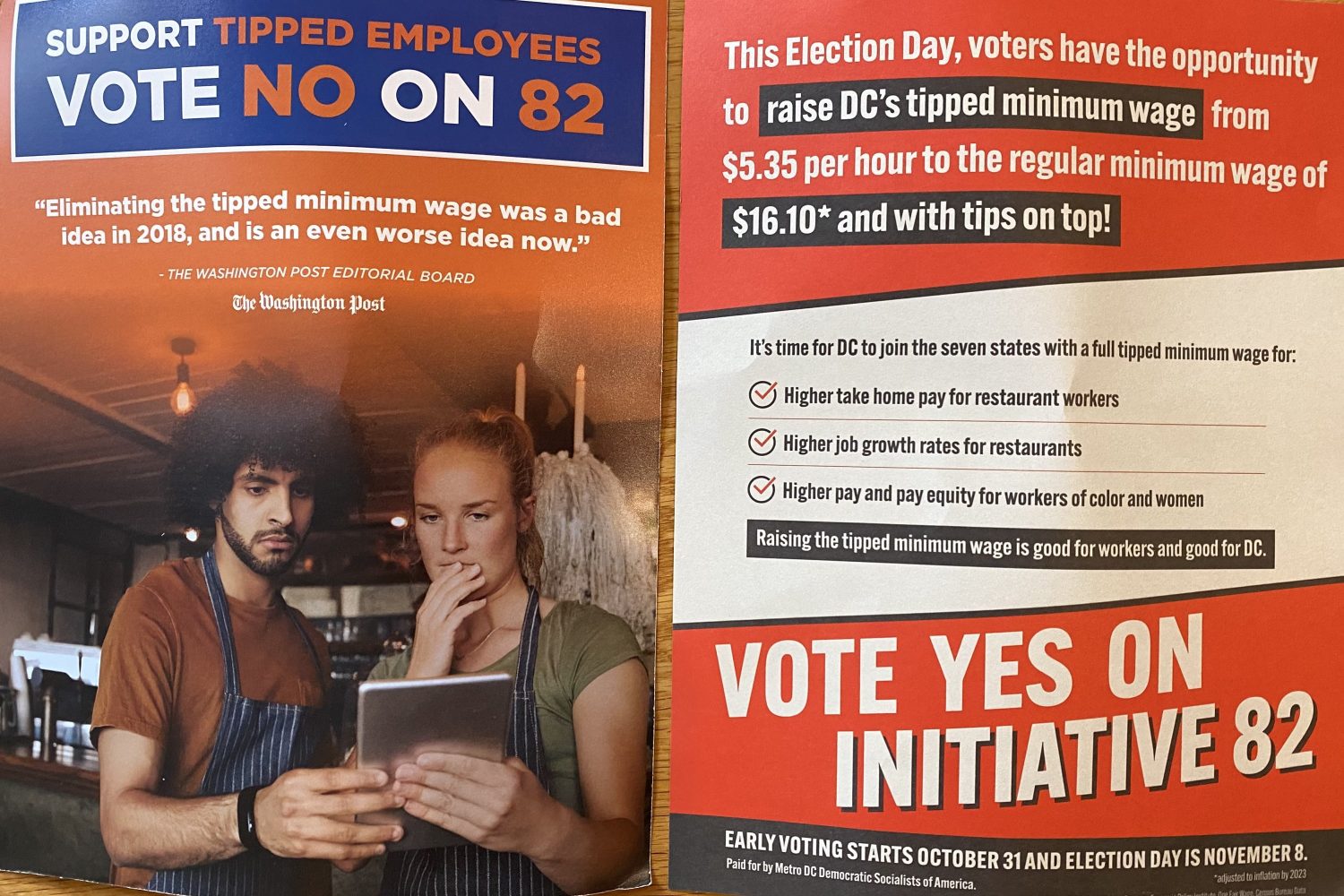DC voters will soon decide whether to eliminate the tipped minimum wage. The ballot measure, dubbed Initiative 77, has the potential to transform the way restaurants operate, servers and bartenders are paid, and diners eat out. But we don’t blame you for finding it all confusing. So, here’s a primer:
First off, what is the tipped minimum wage?
The minimum wage in DC is $12.50 an hour. (That will rise to $15 by 2020.) But servers, bartenders, and other tipped workers have a lower minimum wage—$3.33 an hour ($5 by 2020)—and make up the difference in gratuities, aka the “tip credit.” Employers are required by law to cover workers if they don’t earn enough tips to reach the minimum wage.
What would Initiative 77 do?
It would ultimately eliminate the tipped minimum wage and create one universal wage for everyone. This would happen gradually—by 2026.
Who’s for it?
Restaurant Opportunities Centers United, a national advocacy organization that aims to improve wages and working conditions for restaurant workers, pushed to get the initiative on the ballot. Advocates of “One Fair Wage” argue that the tipped wage makes incomes too unpredictable and that workers should not be dependent on the generosity of strangers.
Although ROC United is not anti-tipping, they say the two-tiered wage system is inherently discriminatory toward people of color. They also argue it encourages women to put up with sexual harassment from customers. They claim workers in states that have a tipped minimum wage (like DC) are twice as likely to experience sexual harassment than those in states that don’t.
Advocates of Initiative 77 also say enforcement of the tipped wage system is too disorganized and lax, and when employees fall short of the minimum wage, businesses don’t do a good job of making up the difference. They believe a less complicated universal wage would fix this.
Who’s against it?
More than 100 local restaurant and bar owners—from Rose’s Luxury, Big Hunt, Thip Khao, and beyond—have signed a letter asking people to vote “no” on Initiative 77. Their campaign will go live on social media at today, joining a parallel “Save Our Tips” effort from the Restaurant Association Metropolitan Washington.
Opponents say the initiative is trying to fix a problem that doesn’t exist; bartenders and servers typically make more than minimum wage already ($20 to $40 an hour in many cases). Some predict a mass exodus of talent from the city if 77 passes. They also don’t believe systemic problems of discrimination and sexual harassment will be solved with one wage for all. As for enforcement issues? That’s something they’d like to see worked on separately, because everyone should already make minimum wage under the existing law.
Another major concern is that the added labor costs will hurt businesses, particularly smaller, independently owned spots that can’t easily absorb the extra payroll. Restaurateurs say they would have to drastically raise prices on food and drinks and/or cut staff and staff hours. They say it would discourage restaurant owners—especially women and people of color who historically have less access to capital—from opening or expanding businesses in DC.
So… will I still tip on my meal?
This ballot initiative doesn’t ban tipping, but many restaurant and bar owners say they would eliminate it in favor of a mandatory service charge, which they’re not legally required to share with employees. Depending on who you ask, this may (or may not!) affect the quality of your service.
Others say this angle is overblown and that most restaurants will likely keep tipping.
Restaurateur Danny Meyer eliminated tips. Isn’t that the cool new thing?
It’s certainly an idea that has gained traction in recent years, with mixed results. Danny Meyer—the New York restaurateur behind Union Square Cafe, Gramercy Tavern, and Shake Shack—is the biggest name in the industry to experiment with “hospitality included” at his upscale establishments. Among his incentives: balancing out the pay disparity between the kitchen and the front-of-house, as well as keeping up with the rising minimum wage.
Meyer says he lost 30 to 40 percent of his “legacy” front-of-house staff as a result, and some others say they’re not making what they used to. But Meyer argues the turnover was a good thing because the new staff see their work as a full-time profession and are thrilled with the model. Meanwhile, his restaurants fielded more applications for kitchen jobs.
In Washington, only a couple of establishments have tried eliminating tipping. Most notably, Sally’s Middle Name on H Street Northeast. However, the restaurant abandoned the policy in large part because it wasn’t busy enough at the time to warrant the higher wages.
Have other states eliminated the tipped minimum wage?
Yes: Alaska, California, Minnesota, Montana, Nevada, Oregon, and Washington.
How’s that working out?
Again, each side has its take. ROC United likes to point out that the restaurant industries are thriving in cities like Seattle and San Francisco, which are gradually moving to a universal $15 minimum wage. They say that change has largely not led to the elimination of the tipping system or reduced tipping. One oft cited statistic: the number of food and drink business licenses in Seattle has increased by six percent since the city adopted its $15 minimum wage.
Now, the other side paints a less rosy picture. One recent study of Seattle from the University of Washington found that while the pay went up for low-wage workers, employers reduced hours, resulting in an average loss of $125 per month. The report also estimated the change in law resulted in 5,000 fewer low-wage jobs.
So, when do I vote?
June 19.
Correction: A pervious version of this story stated that Maine also eliminated the tipped minimum wage. Voters in the state passed a referendum to remove the tip credit, however the legislature overturned it.

















